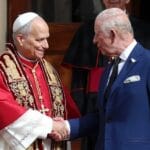The gospel reading for Trinity 14 in Year A, Matt 18.15–20, comes within the fourth of the five collections of teaching organised by Matthew to, in some sense, present Jesus as a new Moses. Having focussed on discipleship (Matt 5–7), mission (Matt 10), and the kingdom of heaven (Matt 13), this collection gathers sayings on life together in the ekklesia, and the last (Matt 24–25) will focus on the eschaton, the end of all things. Although there are some parallels with some of the verses here in Luke’s gospel, much of the material is distinctive, and the long parable of the unforgiving servant in verses 23 to 35 is unique to Matthew.
This mention of the ekklesia has led to some calling Matthew ‘The Ecclesiastical Gospel’, and it can easily be taken as a projection back onto Jesus of the concerns of the later community. But as we noted two weeks ago, the word ekklesia should not be translated by the English word ‘church’, with all its associations of buildings, institutions, establishment, and regulations. To do so would be to open the door wide, allowing us to march into the text bringing all our presuppositions with us, and march out again carrying confirmation of what we wanted to hear.
The Greek term ekklesia never denotes a physical structure in the NT [nor, I would add, an institution with regulations and structure] but always a community of people. The new temple is not a building of literal stones, but consists of ‘living stones’ (1 Peter 2.5). (R T France, NICNT, p 623)
In other parts of the NT, we need to bear in mind the Greek civic meaning of ekklesia as the ‘assembly’ of people to gather for decision-making, primarily the citizens of a polis making decisions about its governance, but also used for social and religious groups. But here its primary background is from the Greek Old Testament (the Septuagint, LXX) for the ‘congregation’ of the people of Israel, the people of God. That Jesus can, emphatically according to the Greek word order, talk of ‘my ekklesia‘ thus has strong Christological and theological implications; this new community is the Israel of God, a people who are constituted around neither ethnic identity nor the torah of God, but around the Messiah that Peter has just recognised. This is a (re)new(ed), international, Jesus-centred Israel.
Jesus’ description of the situation that needs addressing bears careful reading. The person who has sinned is described as ‘your brother’—but the term adelphos cannot here mean a male disciple only, since Jesus has already taught (in Matt 12.50) that the new kinship group of his disciples includes his metaphorical ‘brother and sister and mother’, and Matt 27.55 makes it clear that women are part of the group of disciples. Thus most modern translations render this ‘your brother or sister’ as they do in Matt 5.22–24; the limiting of the ESV to one sex ‘your brother’ is without warrant.
The instructions here assume that the ‘sin’ is evident and undisputed; the differences here are not in perception, but in action.
The possessive ‘your brother or sister’ is singular; the situation envisaged is not one of formal, hierarchical discipline within a structured community, but of one member of the family of faith concerned for another. It is therefore impossible to separate this instruction from the teaching that has immediately preceded it, when Jesus enjoins us to ‘not despise one of these little ones’ (Matt 18.10). The language of ‘little one’ is characteristic of Jesus in Matthew, and includes ‘the least of these my brothers and sisters’ (Matt 25.40) in the so-called parable of the sheep and the goats, where it must mean disciples of Jesus, and not the poor in general.
Most of the later manuscripts follow ‘sin’ with ‘against you’, and thus many English translations include this. But the earliest manuscripts do not include it; it is hard to imagine why a copyist would drop the phrase; and the phrase εἰς σὲ sounds exactly the same as the ending of the verb ἁμαρτήσῃ so it is easy to see how it could be added by mistake. The whole tenor of these instructions is about concern for the brother or sister, and not about settling a grievance (though that question is addressed later) and so we can be confident that it was not original.
The action prescribed is not mild; the verb here describes the action of John the Baptist in rebuking Herod in Luke 3.19. But the focus is on a minimum of exposure; Jesus is emphatic that the conversation is ‘between you and him/her alone’. The whole aim of the exercise is not to win an argument, but to win the person—the opposite of the possibility mentioned in the previous verses that they should be ‘lost’.
The second phase of action continues to keep the whole affair low-key, in calling on one or two others (the group of two or three will be mentioned again below) to confirm testimony. The principle or ‘two or three witnesses’ is drawn from Deut 19.15, which is quoted almost verbatim here, but is also expressed in more serious contexts in Num 35.30 and Deut 17.6. The context of the OT verse is of a formal judicial process—but the principle of two witnesses is widespread in the NT. In John 8.18, the Father testifies to the ministry of Jesus in fulfilment of this requirement; at Jesus’ trial, two witnesses are sought to bear false witness in Matt 26.60; and in Revelation the name ‘Jesus’ is repeated 2 x 7 times, reflecting the fact that he is the ‘faithful witness’.
The last resort, once the two stages of private appeal have been fruitless, is to appeal to the whole community. Again, the issue here is not a personal grudge, but the seeking out of a member of the family to restore them to full fellowship. Again, there is no mention of any structure of formal leadership; the whole community are each concerned for every individual—note the discussion above about ekklesia not being ‘church’ but ‘people’. The issue here is not a formalised exclusion; the instruction for ‘you to treat them’ is singular, addressed to the individual.
The language of ‘Gentile or tax collector’ follows conventional Jewish assumptions that both non-Jews and Jewish collaborators with the Roman occupiers (as tax collectors were) were morally inferior, and outside the accountability of the holy people of God. It is clear from Jesus’ encounter with the centurion and the Canaanite woman that the good news of the kingdom extended to include them, and by now Matthew’s readers would not only have been aware of that, but would themselves have included Gentiles as well.
The overall image here is of a whole community concerned for each other, taking responsibility for each other’s spiritual well-being. The concern to win over the brother or sister reflects the shared concern by each one that reflects God’s own passion that ‘none should be lost’.
In a formally constituted church with an appointed leadership it is easy for the ‘ordinary’ disciple to hide behind that authority structure and to leave it all to the official leaders, appealing to Cain’s question ‘Am I my brother’s keeper?’ with a comfortable assumption that the answer must be No. But this passage asserts that the answer is Yes. In a community of ‘little ones’ each must be concerned about and take responsibility for the spiritual welfare of the other. (R T France, NICNT, p 692).
Some English translations assume that the next saying, about ‘binding and losing’, belongs to the previous verses, as if this related to the forgiveness of sin. But the object of the action is neuter, not masculine, so it relates to things and not to people. And the ‘you’ here switches to the plural from the singular, which pairs it with the saying that follows rather than the teaching that precedes it.
As we noted two weeks ago in relation to the almost identical saying in Matt 16.19, ‘binding’ and ‘loosing’ are rabbinic terms denoting ‘forbidding’ and ‘permitting’ respectively, as we have seen already in Matt 5.19. This saying is about community decision-making, and not about the forgiveness or ‘retention’ of sin (whatever that last term might mean), and when applied to Peter, with his keys, points to issues of household management. The role given to Peter there is now extended to the community as a whole, so that Peter is first amongst equals rather than having a uniquely authoritative position.
As previously, the grammar is rather awkward, using future perfect tenses (‘will have been bound’) which most English translations avoid. As France commented on chapter 16:
The heavenly ‘endorsement’ of Peter’s decisions is expressed (both here and in Matt 18.18, twice in each verse) in the unusual syntax of future perfect passive verbs, ‘will have been tied up’, ‘will have been untied’…With simple futures, Peter would take the initiative and heaven would follow. But with future perfects the impression is that when Peter makes his decision it will be found to have been already made in heaven, making him not the initiator of new directions for the church, but the faithful steward of God’s prior decisions. [T]he saying becomes a promise not of divine endorsement, but of divine guidance to enable Peter to decide in accordance with God’s already determined purpose. (R T France, NICNT, p 626–7).
That guidance for Peter now becomes guidance for the whole community.
The theme of two witnesses in the discussion about winning back a member of the community is continued in this next saying, and explains why Matthew has brought these together. It is striking that such a significant and well-known saying is found only in Matthew (there are some parallels in the non-canonical ‘Gospel’ of Thomas) though there are similar sayings of Jesus in John 14.13, 15.7 and elsewhere.
Contemporary Judaism regarded the presence of 10 males as the minimum requirement for corporate worship to be valid—but here Jesus reduced that to something much less restrictive, so that two in agreement are enough. Again, there is no need to see the idea of Jesus’ presence amongst his disciples as a post-Pentecost projection back to Jesus, since Paul could talk of his spiritual presence amongst the Corinthians in 1 Cor 5.3–4—though the out-pouring of the Spirit that makes the presence of Jesus real amongst his followers adds another dimension to it.
From the beginning of this gospel, the Old Testament promise of ‘God with us’ dwelling amongst his people, has been made real by the presence of Jesus (Matt 1.23). We have already seen Jesus teach that his death will not be the end, but his life and presence will continue in his resurrection (Matt 16.21, 17.9, 23) and his parting promise is that he will ‘be with you’ (Matt 28.20). His disciples will continue not merely to be followers, but will also be his companions—and this promise is not given to ‘a formal ecclesiastical council’ (France, p 698) but to any two or three of his people. It is not just personal, but communal.
There is a rabbinical saying from the early second century (that is, after the destruction of the Temple which signified the presence and glory of God) that ‘If two sit together and words of the Law are between them, the Shekinah [glory of God] rests between them’ (m. Abot 3.2). For Matthew, Jesus is now the Law around which the community gather, and God’s glorious presence is made known in that Jesus-centred community.
Additional note. My friend Richard Hayes forwarded this fascinating insight from a Jewish friend, which I think supports the observations made above.
Qahal or Ecclesia
The idea of Qahal is contained within Tanakh and mentioned 122 times in the Hebrew Bible. It came to mean later in history the legal structure of the community and is rooted in the word ‘congregation or assembly’. There is competing terminology for this word: Edah meant the entirety of Israel; Qahal in ancient times offered to referred to judicial assemblies. Ecclesia is also an Assembly in Greek: the convenor of the Assembly is Kohelet in Hebrew which is the Hebrew name for the Book of Ecclesiastes (which is an illustration of the crossover of the two words). In the case of the Kohelet—he is presumed to be the convenor of the Assembly of the public reading of the Torah by the King ie. The King himself which is why in the Jewish tradition Kohelet is authored by King Solomon.
Here (in Matthew 18) it appears to be used as the authority of the community. So yes Qahal and Ecclesia are at this stage apparently interchangeable. Remember that the Jewish world is very much divided linguistically into the world of Aramaic and Greek, with Hebrew being the Holy Language no longer spoken on a day to day basis. The Septuagint and (Targum) Onkelos being examples of this. Presumably the Latin world is somewhere too (but that’s for another day).
Three distinct judicial ideas
The passage itself mirrors three ideas contained in Talmud Torah, ideas around judicial matters and in particularly the odd number of judges is something that appears elsewhere—ideas around preventing losh (gossip) and the need to recognise the ruling of the court.
The first is easy enough to understand. It mixes ideas of a court of three with another idea that there is a need for two witnesses. These processes are there to ensure fair judicial process and the rights of the defendant are upheld.
The second is to protect the accused from gossip. This is based in Halakhah (Jewish Law) that you cannot undo accusations or gossip hence the need to go directly to the person and not have the accusations (wrongdoing) aired in public.
The third is looking at the authority of the Qahal or Ecclesia (I suspect that in it’s earliest form there was not intention to split from the Jewish world—but again a discussion for another day). The text is suggesting a form of herem (expulsion) for not recognising the judicial authority. This is serious if the person was dependent socially and economically on the community. Later, within the ghetto, this would be a way to enforce rulings. It meant no one else who was a member of the community could interact with the person under herem. There are different levels of herem and these are not indicated in the passage. It seems the social exclusion here is a serious punishment for not recognising the ruling of the Qahal/Ecclesia.
Rabbi Alex Goldberg, Dean of Religious Life and Belief at the University of Surrey
You can join Ian and James as they discuss this passage here:

 Buy me a Coffee
Buy me a Coffee




























What position on the role of physical buildings did the later (Cappadocian) church fathers take please?
The opening of this chapter is very interesting given the long running saga of recent posts
“Who then is greatest in the kingdom of heaven?”
We can imagine the disciples arguing amongst themselves about which one was the greatest (as they did in Luke 9:46 and other places), and then saying, “Let’s let Jesus settle this”.
The disciples wanted to know who would hold the highest position in the administration Jesus would soon establish.
Jesus then sets up a child as an example of humility.
Jesus said we have to take this kind of humble place to enter the kingdom, much less be the greatest in the kingdom.
It also tells us something about Peter. If Peter really was to be regarded as the first pope in the way Popes are regarded by Roman Catholic theology and history, Jesus should have declared that Peter was the greatest in the kingdom of heaven.
He goes on to show that if anyone harm these little ones it is God who ultimately deals with those who offend His own, it shows that He defends and protects His own. This teaches us that in Jesus Christ, no other person can wreck our life. If they bring offense in our life, God will deal with them, but not forsake us in time or eternity.
In my life there have been several situations where there have been great injustices perpetrated against me [once in a church] and in every case God has taken very severe vengeances’, even years later, there was no doubt that vengeance is mine says the Lord I will repay.
It is a fearful thing to fall into the hands of the Living God.
On further reflection. “Take heed that you do not despise one of these little ones, for I say to you that in heaven their angels always see the face of My Father who is in heaven.”
Heb 1:14 Are they not all ministering spirits, sent forth to minister for them who shall be heirs of salvation?
Often God has sent an angel to my aid, one was a Rastafarian mechanic!
Or I have prayed for the help of an angel to great effect.
What a great adventure it is to be a child under Gods’ care!
The study of angels or the doctrine of angelology is one of the ten major categories of theology developed in many systematic theological works. The tendency, however, has been to neglect it.
See //bible.org/article/angelology-doctrine-angels
Jesus’s comment about “a Gentile and a tax-collector” in verse 17 surprised me; as you remarked in the video discussion, it rather clashes with his own views and actions throughout the gospels. Do you think it is evidence of Jesus using humour in the form of irony? Is irony a key element in Judaism?
In one way, yes. But I think it is evidence of two others things.
First, the historical context preserved, of Jewish Jesus speaking to a Jewish audience, which we are over-hearing.
Second, the remarkable thing that ‘gentiles and tax collectors’ are no longer merely this in Jesus, but even we gentiles are now feasting at Abraham’s table.
The historical context preserved? A Jewish Jesus speaking to a jewish audience? But what happens when the “Israel of God” takes over the show? Does the “international” community require a *historical Jewish* Messiah.? Or does the Leader of the ‘United Nations’ no longer require the title of *Lion of Judah* [Rev. 5:5]